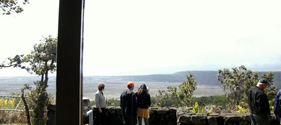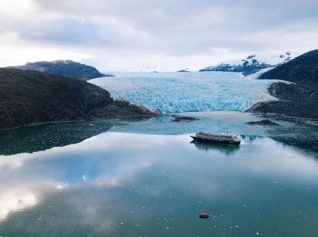Hawaii ecotourism mixes travel, environmental purpose

From hands-on programmes to hidden initiatives, Hawaii resorts and tour operators have come up with some unique ways to help the environment.
KapohoKine Adventures’ tour stops at Volcano Winery and includes dinner at Volcano House, which overlooks the crater inside Hawaii Volcanoes National Park, and is known for locally sourcing up to 95 percent of ingredients
From hands-on programs to hidden initiatives, Hawaii resorts and tour operators have come up with some unique ways to help the environment.
As part of the Grand Hyatt Kauai’s Enrich "voluntourism" programme, guests can sign up to remove invasive plants from Kokee State Park, high above Waimea Canyon. A field supervisor with the nonprofit Hui O Laka meets volunteers three days a week, showing them restored forest areas before helping them pull up Florida blackberry, lantana and other invaders.
One of Hawaii Forest & Trail’s newest tours also involves reforestation, in this case with the goal of saving the endangered palila, a honeycreeper that numbers only about 1,000, all on the slopes of Mauna Kea. Created as part of the Mauna Kea Beach Hotel’s 50th anniversary celebration, the monthly My Mauna Kea tour starts with spotting palila among high-elevation mamane trees – the birds’ primary source for food and nesting – before planting or tending mamane seedlings on former forest land cleared for cattle ranching more than a century ago.
KapohoKine Adventures’ new Farm, Fork and Fire tour focuses on the sustainability of local farming, in a state that imports 90 percent of its food. It begins with visits to Hamakua Mushrooms and Volcano Winery, and ends with a private cooking demonstration and dinner at the Volcano House, overlooking the glowing crater inside Hawaii Volcanoes National Park, and known for locally sourcing up to 95 percent of ingredients.
Turtle Bay Resort is in the process of installing "hydration stations" across its property and offering guests refillable bottles, in the hopes of reducing consumption of plastic water bottles "by 80 to 90 percent" within 90 days, according to Scott McCormack, Turtle Bay’s vice president of real estate.
Many hotels in Hawaii are increasing their environmental initiatives, although it’s not always visible to guests. The Kaanapali Beach Hotel, for example, won the 2014 Best New Green Product award from the U.S. Green Building Council for its use of the Bio-Amp, which ferments bacteria that remove grease and other organic matter from drain lines.
Source: Jeanne Cooper
Valere Tjolle
@ValereTjolle
Interested in moving to a world beyond commodity tourism? SEE: A world beyond tourism
 United Kingdom
United Kingdom United States
United States Asia Pacific
Asia Pacific












































BA suspending all Heathrow to Abu Dhabi flights
Unexpected wave rocks cruise ship
Report: Cruise guest died after ship lashed in heavy storm
British teen in serious condition after paraglider collision
JetBlue scraps London Gatwick flights